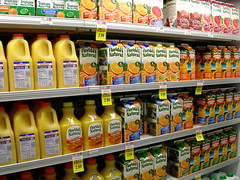 Fruit juice could reduce the effectiveness of some medicines
Fruit juice could reduce the effectiveness of some medicinesI've previously had posts that pointed out that fruit juice was far from being a health food.
Mark Sisson explained some of the concerns the other day in an excellent post - Mark what's wrong with juicing?
The take-home message is this: juice can offer a decent source of nutrients on days when it’s hard to work in your usual amount of fruits and veggies, but it’s just not an adequate substitute for the real/whole source. (Note: It also requires that you recalibrate your overall carb load that day.)
Here is something else to consider:
Research presented at a US conference suggested a chemical in grapefruit juice could stop anti-allergy drugs being absorbed properly. A University of Western Ontario team said oranges, and possibly apples, had similar ingredients. Grapefruit juice is already known to interfere with blood pressure drugs.There are more details in a press release from the University of Western Ontario.

1 comment:
I find it so weird when some new study pops up saying that grapefruit juice prevents drugs from being absorbed, as if it is news.
In the cytochrome P450 system there are many liver enzymes, but just 6 of them metabolize 90% of drugs. Grapefruit juice inhibits 2 of these 6 (3A4 and 1A2). This means that, statistically speaking, a substantial percentage of *all drugs* are affected by grapefruit juice (and to a lesser extent, other related juices). So when some new drug is, it isn't news. For every 5 new drugs, you should expect 1 or 2 of them to have grapefruit juice interactions.
If you're taking prescription drugs, you should assume that grapefruit juice interferes with them unless you've checked otherwise.
See for example: http://findarticles.com/p/articles/mi_qa3804/is_200201/ai_n9083616
Post a Comment